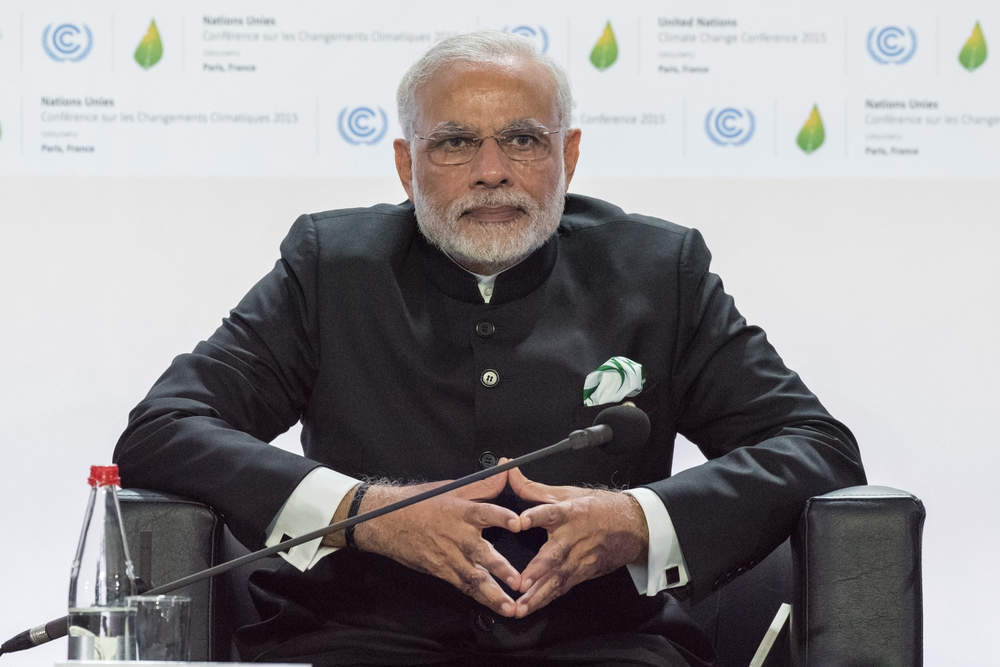
India’s prime minister Narendra Modi opened the 48th annual World Economic Forum in Davos today — mounting a defence of globalisation while calling for action on climate change and economic cooperation between nations.
While Modi’s speech echoed much of Chinese president Xi Jinping’s rousing speech last year, Modi failed to generate the same enthusiasm — despite taking a swipe at US president Donald Trump’s America First agenda.
The opening of the economic symposium was marred by travel delays, as heavy snow in the ski resort town made it tricky for Davos delegates to arrive from Zurich and the roads were clogged with traffic.
Forget talk of Trudeau and Modi – the Davos day ends as it started with an almighty traffic jam – and relief the snow’s stopped #WEF2018 pic.twitter.com/6pnTB6oX4I
— Richard Griffiths (@richardgriffo) January 23, 2018
How well do you really know your competitors?
Access the most comprehensive Company Profiles on the market, powered by GlobalData. Save hours of research. Gain competitive edge.

Thank you!
Your download email will arrive shortly
Not ready to buy yet? Download a free sample
We are confident about the unique quality of our Company Profiles. However, we want you to make the most beneficial decision for your business, so we offer a free sample that you can download by submitting the below form
By GlobalDataThe Forum’s theme is “Creating a shared future in a fractured world” and the organisers hope that the 3,000 or so participants will share solutions to resolve the world’s most pressing problems and challenges, such as inequality, climate change and innovations in technology and labour markets.
Read more: Davos attendees 2018 — all the big names who will be at the World Economic Forum
Here’s a run down of the biggest talking points from Davos day one.
1) Modi declares whoever is able to control data can dominate the world
During his opening speech Modi said that data is a huge asset but that “the flow of global data is creating the biggest opportunities and the greatest challenges”.
Modi (speaking in Hindi) said he believes that whoever is able to control the data can dominate the world.
He said:
Technology-driven transformation is deeply influencing the way we live, the way we work, behave and talk to each other and influencing international politics and economics.
This technology-driven world has influenced every aspect of our lives … Technology has the ability to bend, break and link and a very good example of these three aspects is the use of social media.
Data is a huge asset but the flow of global data is creating the biggest opportunities and the greatest challenges.
Modi opened his speech with a history lesson: It’s been 21 years since an Indian PM was at Davos — way back in 1997, when HD Deve Gowda visited.
In 1997 India’s annual GDP was just $400bn — it is now six times larger.
India PM Modi speaks in Davos of a “shared future.” Waiting for him to stand up to the Hindu nationalists and mention India’s Muslim community as a part of that future. Or the present. #WEF2018 pic.twitter.com/18DvsY1y7I
— Kenneth Roth (@KenRoth) January 23, 2018
2) Is this the calm before the storm?
Barclays chief executive Jes Staley — speaking on a panel about the financial crisis — warned Davos feels “a little bit like 2006 when we were all talking whether we’ve solved the riddle of economic crises”.
The Carlyle Group David Rubenstein agreed:
Generally, when people are happy and confident, something wrong happens.
Stock markets around the world have registered record highs in recent months, with the US market sent higher by blowout earnings in the past two weeks. Some 82 percent of S&P 500 firms that have report have managed to top earning estimates.
So far this year all-time highs have been achieved in markets from London, to New York, and in Australia and France.
The main reason for the spectacular run has been solid economic growth around the world sending
However, with the US the bull market nearing its tenth year, it will be one of the longest in history — and many are beginning to ask: How long can it last?
3) Trudeau announced time is up for sexual harassment
Canadian prime minister Justin Trudeau has urged business leaders to help fight inequality by hiring, promoting and retaining more women.
This year’s event is the first ever to be chaired entirely by women though women make up just 21 percent of attendees this year.
Trudeau said:
These movements show us we must have a critical discussion on women’s rights, equality and the power dynamics of gender. Sexual harassment in business and government is a systemic problem and it is unacceptable. As leaders, we must recognise and act to truly show that time is up.
4) Google et al put on warning — the good times won’t last
Today’s giant tech companies such as Facebook, Google, Amazon, and Apple — some times seemingly all powerful and omniscient — have been warned their time at the top of the tree won’t last forever.
MIT economist David Autor has predicted that the big tech companies of today will succumb to the same fate as their predecessors.
Autor said:
I would guess that Facebook will be almost non-existent 20 years from now.
5) A new humanitarian crises could break out this year
Peter Maurer, president of the International Committee of the Red Cross, has warned there are a lot of fragile situations around the world that could develop into “full-fledged” conflicts this year.
Maurer pointed to the Southern Philippines (which is under martial law), Myanmar and the Rohingya crisis, Afghanistan, the Middle East, and large parts of Africa as potentially at risk.
Maurer said:
In 2018 we face a big gap between the needs of people and the capacity of the international system as a whole to respond. The gap can only be bridged by more and better finance.
6) Cate Blanchett calls for help for refugees
The actress Cate Blanchett — who will along with singer-songwriter Elton John and Bollywood actor Shah Rukh Khan received awards in Davos today for their work raising awareness about human rights issues — has called for more to be done to help the world’s refugees.
Blanchett accused politicians of pandering to populist voices.
She said:
I think it’s shameful. There’s so much misinformation about refugees. They are forced to flee, and then they are vilified in the media.
Cate Blanchett on #refugees: 66 m #displaced, 22 m refugees, 50% of that women and girls. Only 1% have resettled in developed countries. The developing world is shouldering the burden! #Davos #WEF18 pic.twitter.com/Y4TDIovQTj
— Mauricio Zuazua (@mauriciozuazua) January 23, 2018
7) Salesforce boss wants his company regulated
The technology industry has become so big and so powerful that it needs regulating, according to Salesforce’s chief executive, Marc Benioff.
Benioff made the point that the tech industry is at the point where regulation is necessary speaking on a panel about trust in technology.
He said:
We’re at the point for regulators and governments to in and point true north. In the tech industry, we’ve been remarkably clear of those regulators for the whole industry lifespan, but we’re seeing the signs.
Some of this technology is so powerful and so deep and so multi-dimensional that even these companies don’t understand how it’s being used in nefarious ways.
8) US first lady Melania Trump will not be coming to Davos
In a change of plans announced today Melania Trump will not be joining her husband US president Donald Trump on his trip to the World Economic Forum in Davos, Switzerland, later this week.
Trump is expected to arrive on Thursday before taking to the stage for one of the event’s closing speeches.
East Wing communications director Stephanie Grisham told CNN that the first lady’s decision to forgo the trip was based on “scheduling and logistical issues”.







